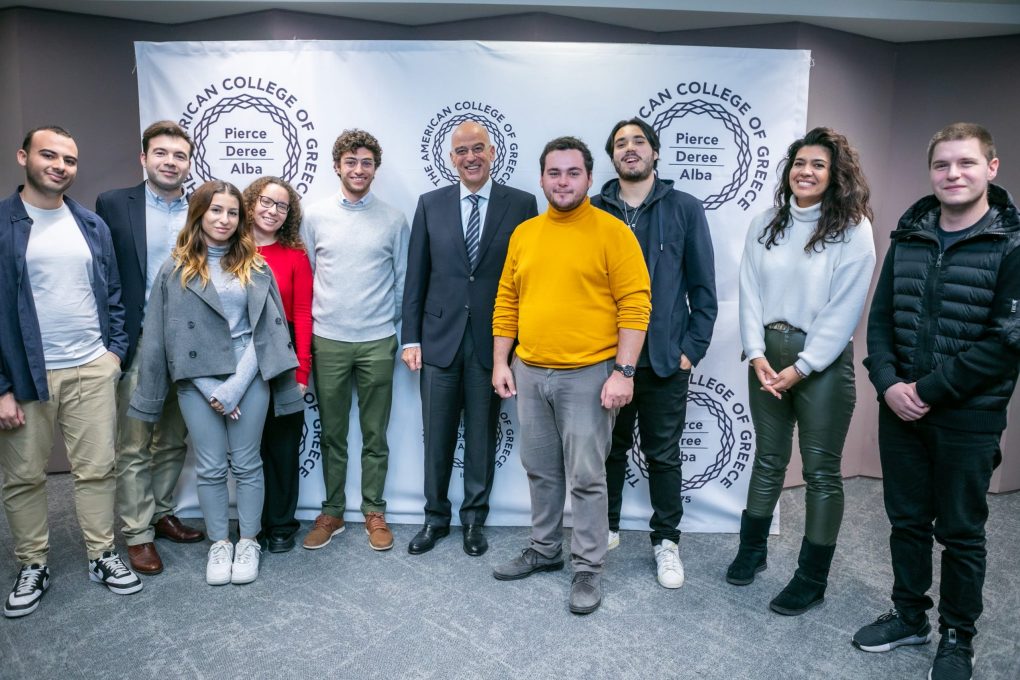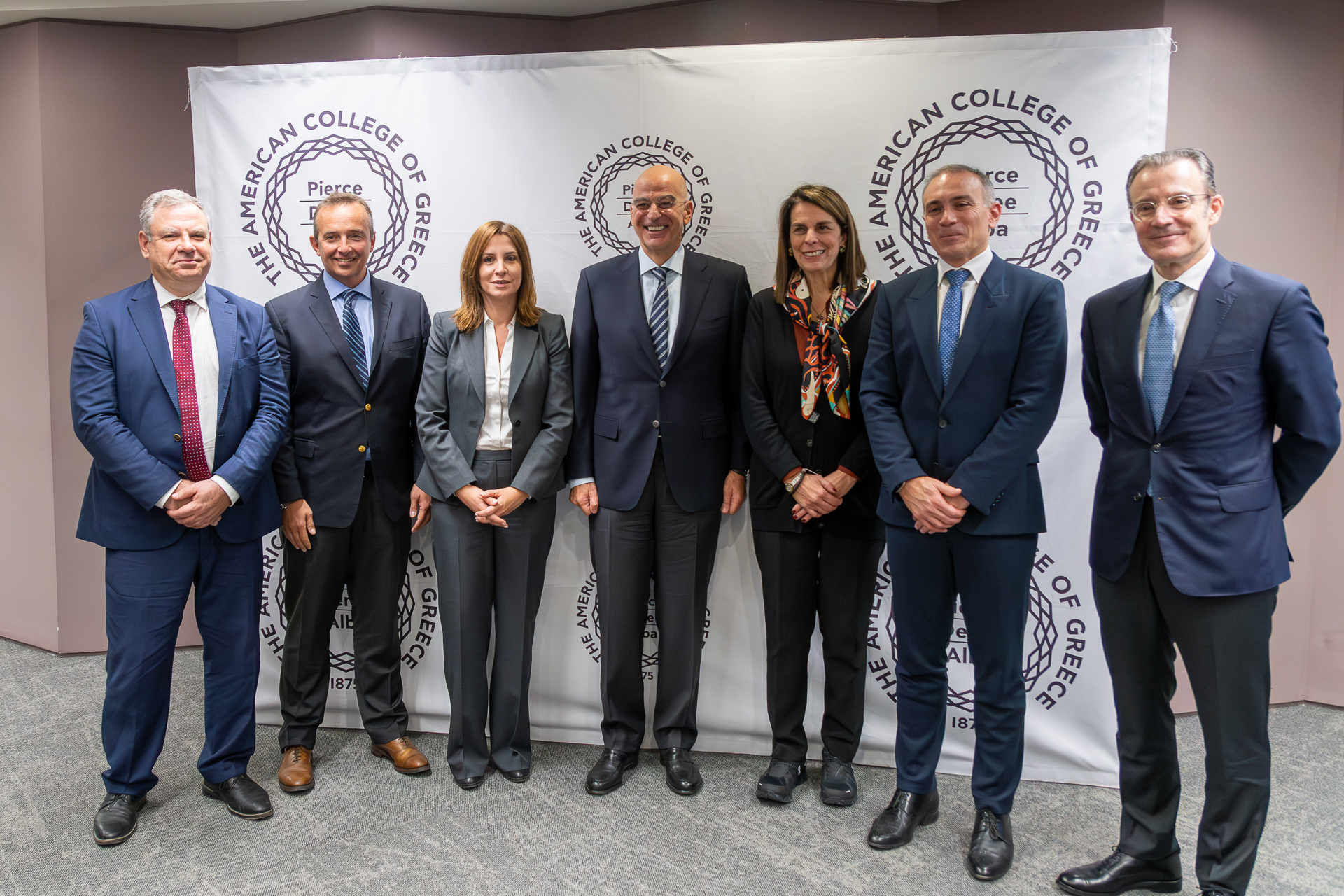
On Wednesday, November 13, 2024, The American College of Greece (ACG) hosted a discussion on the shifting tides of global power, with the event “Transatlantic Shifts and Regional Stakes: A Post-US Elections Analysis” drawing attention to the ever-evolving dynamics between the US, Greece, and the broader Southeast Mediterranean region. Organized by the ACG Office of Public Affairs and the ACG Institute of Global Affairs, in collaboration with the American-Hellenic Chamber of Commerce (AmCham), the event delved into the regional geopolitical and economic landscape forming following the 2024 US elections’ outcome.
Claudia Carydis, Vice President of Public Affairs at ACG, gave the opening remarks by highlighting the college’s ongoing growth and development: “At ACG, we are proud of our long-standing commitment to providing students with a US-style education while expanding our academic programs and partnerships, advancing research, and establishing ourselves as a regional hub for education, attracting an ever-increasing number of international students, most of them coming from the US.” As she said, going forward, ACG aims at further enhancing its academic offerings, more specifically in the areas of geopolitics, security and defense.
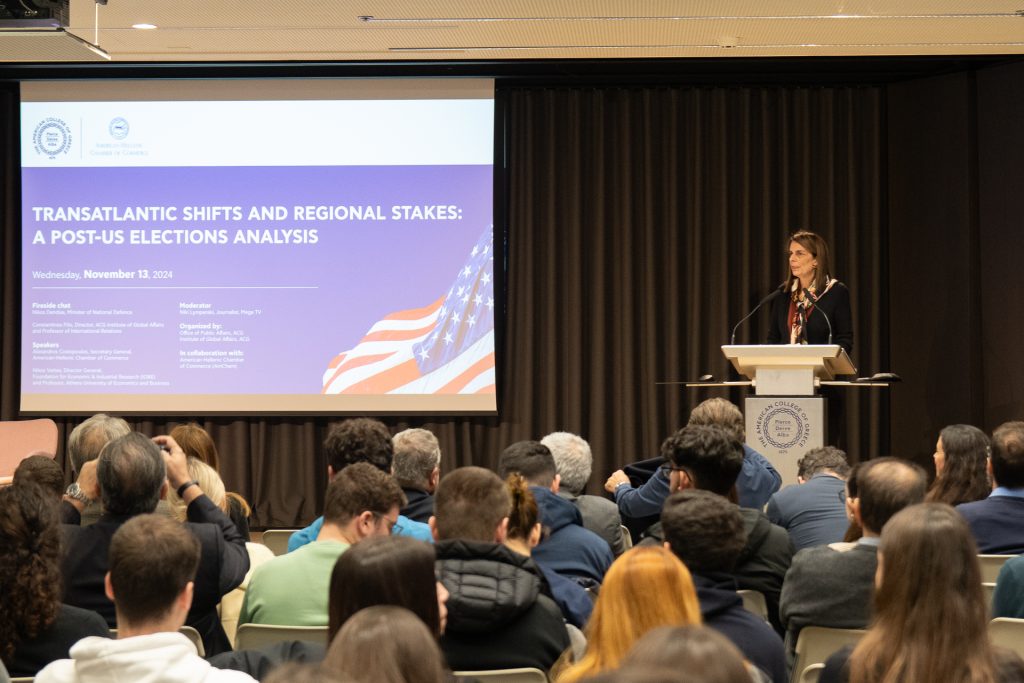
Nikolaos Bakatselos, President of the American-Hellenic Chamber of Commerce, took the podium and emphasized the significance of President Trump’s reelection for US-EU relations: “The current political landscape presents both challenges and opportunities, especially regarding evolving trade agreements.” Bakatselos stressed that while Greece’s relationship with the US remains strong, Europe must prepare for a potentially more protectionist US stance. “Europe must reinforce its cohesion and promote open markets in response,” he advised, highlighting that Europe’s ability to adapt and maintain unity will be key to its ongoing economic strength and global relevance.
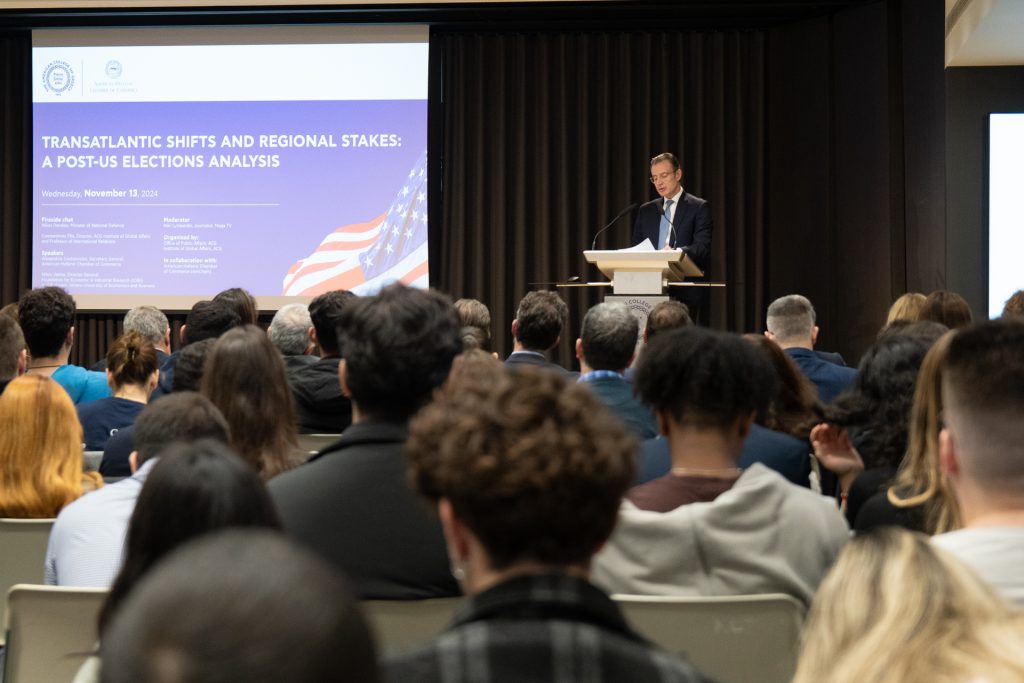
With global economic shifts on the horizon, the event opened with a panel discussion moderated by journalist Niki Lymperaki, exploring the far-reaching global implications of the 2024 US elections. The panel featured two distinguished experts, Alexandros Costopoulos, Founder & CEO of Foresight Strategies & Communications and Secretary General of AmCham, and Nikos Vettas, Director General of the Foundation for Economic & Industrial Research (IOBE) and Professor at the Athens University of Economics and Business. They shared their perspectives on the election results and their potential impact on Europe, Greece, and the broader international landscape. The discussion highlighted the challenges and opportunities the election presents for Europe, emphasizing the importance of adapting to these changes while strengthening relationships with key global players, particularly the United States.
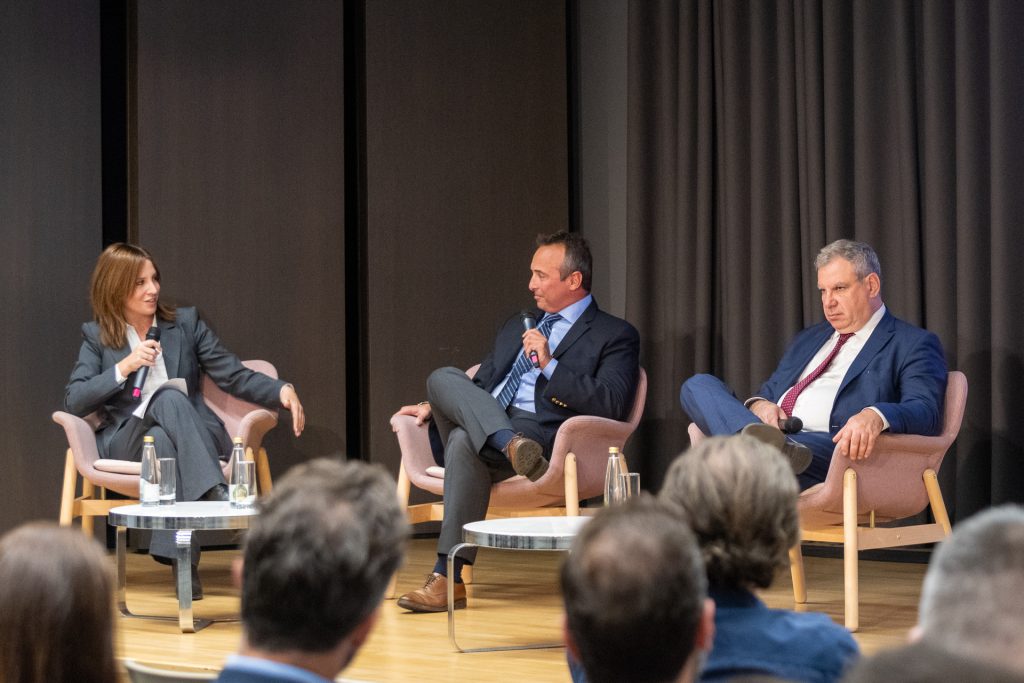
Costopoulos emphasized the need for Europe to adapt to the rapidly changing economic environment. He noted that the traditional structures of the global economy, particularly in Europe, are being disrupted and that countries must find new ways to remain competitive: “The European economy has faced challenges for years, but now, more than ever, we must accelerate reforms to ensure we are prepared for the new global landscape.” He also highlighted Greece’s growing importance as a regional hub for American companies. “Greece is positioning itself as a key player in the Southeast European market, and American companies are increasingly investing here, recognizing the country’s strategic location and reform-driven growth.” He stressed that continued governmental reforms are critical for maintaining this positive trajectory and attracting even more foreign investment.
Vettas focused on the geopolitical ramifications of the election, particularly with regard to Europe’s role in global affairs. He argued that the US’s shift in focus, especially under President Trump, marks the end of an era in which Europe held a central position in Western global strategy: “Europe must not be naive. We need to rethink our approach to international relations, especially in light of the US’s growing focus on other regions like China and Africa.” He pointed out that Europe must strengthen its internal cohesion and autonomy, particularly in defense and energy, to ensure long-term stability when he said, “Investing in defense, energy security, and high-tech sectors is crucial for Europe’s future. Greece, in particular, has a unique opportunity to lead in these areas by continuing to innovate and attract investment.”
The event wrapped up with a stimulating discussion between Nikos Dendias, Minister of National Defense, and Dr. Constantinos Filis, Professor of International Relations at Deree and Director of the ACG Institute of Global Affairs. Dendias shared his perspective on the challenges and opportunities facing Greece, especially in relation to the US and NATO: “Greece must remain on its course, explaining to the United States why supporting what we believe is right is also in their interest.” This emphasis on dialogue and strategic alignment reflects the Greek government’s commitment to fostering strong international relations, particularly with key allies.
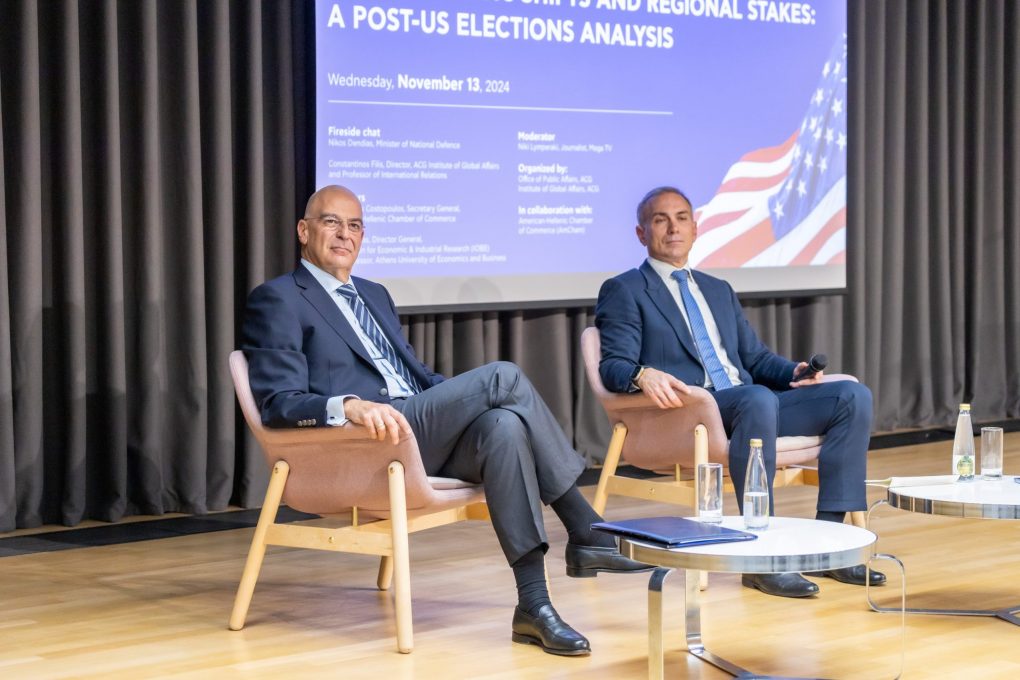
Dendias also highlighted Greece’s defense capabilities and strategic position in the Mediterranean, emphasizing the country’s role in ensuring regional security. “We are not a major power, but we are a medium-sized country with a critical defense role,” he remarked. His reference to Greece’s impressive military assets, such as having more heavy tanks than several European countries combined, underscored the importance of Greece’s defense strategy. He further pointed out that Europe’s reliance on the US for defense must evolve, stating, “Europe must realize that to live peacefully, we must be able to defend ourselves.” This sentiment aligns with his broader vision of Greece taking a more active role in its own security and contributing to European defense initiatives.
Looking ahead, Dendias reflected on the changing global dynamics, particularly in relation to the US’s shifting foreign policy under President Trump. He expressed his belief that Greece’s role as a key ally to both the US and NATO would remain vital, especially with strategic assets like the Port of Alexandroupolis: “No matter what happens in the current conflicts, NATO and the United States will always need Greece as a vital point of communication with Central and Eastern Europe.” He further emphasized Greece’s need for national defense and strategic autonomy, stating, “We must be able to defend ourselves, even alone, if necessary.” This reinforced his message on the importance of Greece as a strategic partner in a rapidly evolving geopolitical landscape.
In the concluding Q&A session, students took the floor to ask Minister Dendias insightful questions. He highlighted ELKAK, a research entity that aspires to cultivate an ecosystem that embraces innovation, supports entrepreneurship, and leverages targeted technological advancements. Its goal is to position Greece as a leader and preferred partner in both defense and civilian technology sectors. Stressing Greece’s strategic potential, Dendias stressed how the country is well-positioned to contribute significantly, provided that adequate funding is secured, and the EU recognizes the necessity to invest strategically, allocate resources, and pursue innovative solutions in the defense sector.
